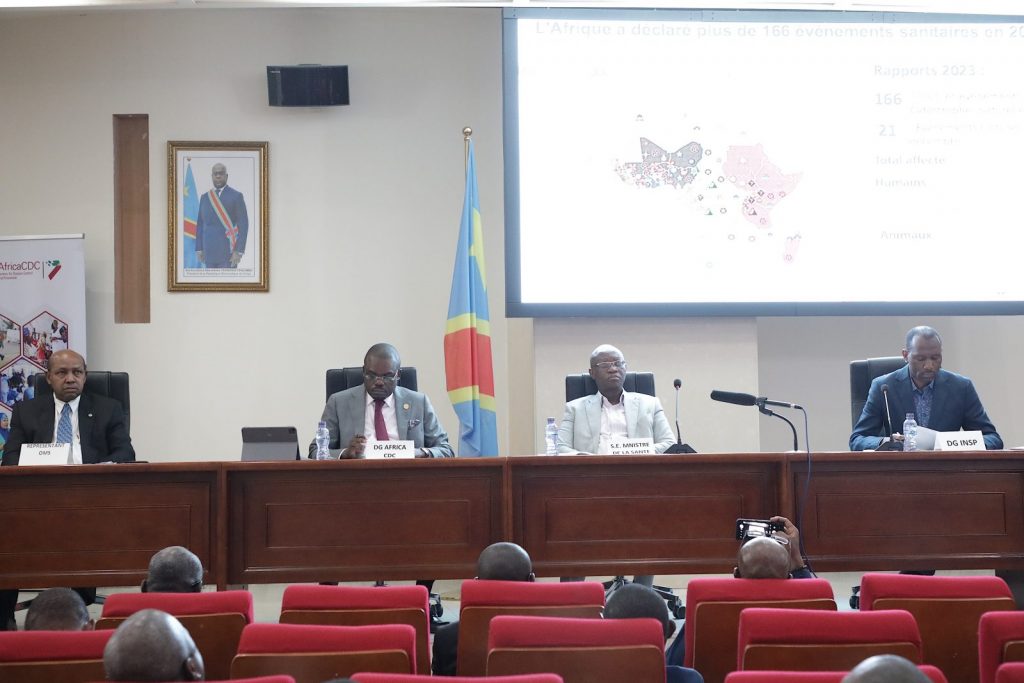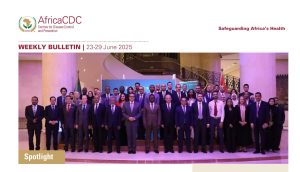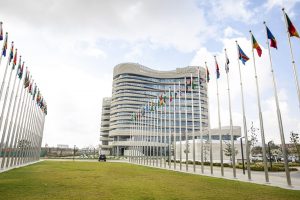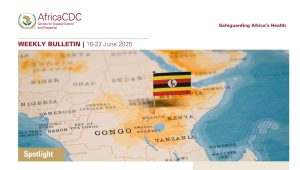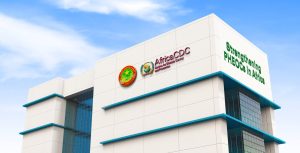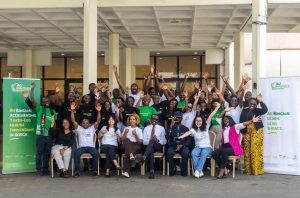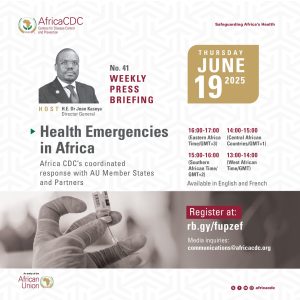Kinshasa, 10 February 2024 – The Africa Centres for Disease Control and Prevention (Africa CDC) conducted a high-level mission from 9 to 10 February 2024 in Kinshasa, the Democratic Republic of Congo. The mission aimed to support government health initiatives through enhanced partnerships and collaboration in addressing emerging and endemic diseases.
Recognizing the vital role of respectful and action-oriented partnerships outlined in the new public health order, Africa CDC and the Ministry of Health convened high-level partners to rally support for preventing and controlling monkeypox and cholera in DRC. The meeting, held on February 10, 2024, in Kinshasa, focused on the current epidemiological situation of monkeypox and cholera, identified response challenges, and mobilized partners’ support for government efforts.
H.E Dr Jean Kaseya, Director General of Africa CDC, highlighted Africa CDC’s support for cholera and Monkeypox response efforts, including deploying experts, training local health workers on surveillance and one health approaches, providing diagnostics, and supporting the genomics initiatives. However, cognizant of the increasing trend and risk of disease spread, the Director General underscored the need for renewed commitment of all partners and heightened response efforts to prevent further spread and control the outbreaks.
Through this meeting, partners had an opportunity to review and approve the action plans for response and further renewed their commitment to supporting the Government of DRC in the fight against Mpox and cholera.
Dr Roger Kamba, the Minister of Health in DRC, acknowledged Africa CDC’s pivotal role, citing empirical evidence that DRC bears a significant burden of monkeypox cases in Africa. “I am establishing a task force to facilitate the coordination of all partners involved in the response efforts,” he said.
From January 2023 to January 31, 2024, Africa recorded 266,436 cases and 4,419 deaths of cholera, with the DRC reporting over 16% of cases. Over the same period, Africa reported 16,549 Mpox cases and 853 deaths, with the DRC reporting 97.5% of cases.
More partnerships
Additionally, in reinforcing cooperation with local partners, the Africa CDC and Soins de Santé Primaire en Milieu Rural (SANRU) signed a Memorandum of Understanding (MOU) to foster collaboration and cooperation between the two organizations. The signing ceremony marked a pivotal moment in advancing healthcare initiatives in the DRC and beyond.
The Africa CDC and SANRU have identified several key areas for collaboration, including advocating for, developing, and strengthening the capacities of Primary Healthcare (PHC) with paid Community Health Worker (CHW) Programs, deploying Risk Communication and Community Engagement (RCCE) activities, facilitating the integration of community health worker programs into national health systems, and partnering to achieve gender equality and autonomy of women and girls in accessing health services.
“The signing of this agreement institutes our shared commitment to accelerate the achievement of universal health coverage and enhance health security in DRC and Africa. By promoting community health programs, supporting multi-sectoral interventions, and building a critical mass of community health workers, we aim to address gender inequalities in access to health, ultimately improving health outcomes for all,” said H.E Dr Jean Kaseya, Director General of Africa CDC.
During the same mission, discussions on improving public health decision-making, policies and practices leveraging locally generated and context-relevant evidence with Prof. Jean Jacques Muyembe, the Director General of the National Institute for Biomedical Research (INRB) of the Democratic Republic of Congo (DRC) were held. Discussions centred on the mechanisms of strengthening research and clinical trials related to monkeypox.
Additionally, Africa CDC engaged with the National Public Health Institute (NPHI) to strengthen the partnership between Africa CDC and NPHI and identify areas of supporting DRC NPHI to fulfil its mission of promoting health by coordinating public health functions and programs to prevent, detect, and respond to public health threats, including infectious and non-infectious diseases and other health events.
The Democratic Republic of Congo (DRC) faces unique challenges due to its biodiversity, ecological complexity, and socio-political landscape, making it vulnerable to public health crises such as cholera and Monkeypox. Coordinated efforts and resources are essential to prevent and respond to such events effectively.
Recent epidemics of Monkeypox and cholera, declared by the Minister of Public Health, Hygiene, and Sanitation, have seen a concerning surge in cases across the nation, even in non-endemic regions. The situation demands extraordinary measures to curb the spread and minimize social and economic impact.
Media inquiries:
For media enquiries please contact:
Dorothy Njagi | Senior Communication Officer- Communication & Public Information directorate | Africa Centres for Disease Control and Prevention| African Union| email: email: njagid@africacdc.org | Website: www.africacdc.org| Addis Ababa| Ethiopia| Facebook | Twitter
About Africa CDC
The Africa Centres for Disease Control and Prevention (Africa CDC) is a continental autonomous public health agency of the African Union that supports member states in their efforts to strengthen health systems and improve surveillance, emergency response, and prevention and control of diseases. Learn more at: https://africacdc.org
About SANRU SANRU (Soins de Santé Primaire en Milieu Rurale) is a non-governmental organization based on the Christian faith. SANRU ASBL has a long experience in public health in the Democratic Republic of Congo (DRC). This goes back to 1981, three years after the WHO launched the concept of “health for all and by all” at the ALMA ATA Conference. Indeed, SANRU was one of the first organizations to implement the project to create and revitalize Health Zones in the DRC for over three decades. Learn more: https://www.sanru.cd/

